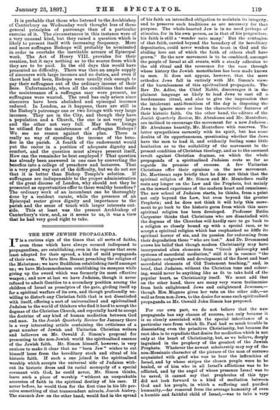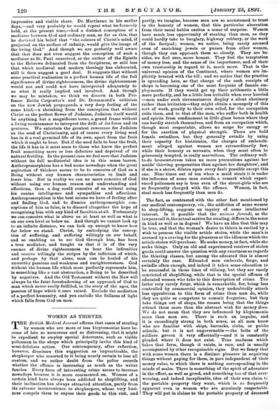THE NEW JEWISH PROPAGANDA.
IT is a curious sign of the times that all sorts of faiths, even those which have always seemed indisposed to propagandism, are establishing, even in the regions that seem least adapted for their spread, a kind of mild propaganda of their own. We have Mrs. Beeant preaching the religion of the Mahatmas; we have Buddhism establishing itself amongst us ; we have Mahommedanism establishing its mosques while giving up the sword which was formerly its most effective weapon ; and now at last we have Judaism, though it never refused to admit Gentiles to a secondary position among the children of Israel as proselytes of the gate, girding itself up for a spiritual warfare of its own, and though profoundly un- willing to disturb any Christian faith that is not dissatisfied with itself, offering a sort of universalised and spiritualised Judaism to the world of thinkers who find it hard to accept the dogmas of the Christian Church, and especially hard to accept the doctrine of any kind of human mediation between God and man. In the Jewish Quarterly Review for January there is a very interesting article containing the criticisms of a great number of Jewish and Unitarian Christian writers and believers on Mr. Oswald J. Simon's proposal for presenting to the non-Jewish world the spiritualised essence of the Jewish faith. Mr. Simon himself, however, is very anxious to make it clear that no "born Jew" wishes to cut himself loose from the hereditary stock and ritual of his historic faith. If such a one joined in the spiritualised worship which accepts the universal side of Judaism with- out its historic dress and its racial monopoly of a special covenant with God, he could never, Mr. Simon thinks, leave such a place of worship "without an unspeakable accession of faith in the spiritual destiny of his race. If never before, he would then for the first time in his life per- ceive something of that transcendent miracle, Jewish history. The staunch Jew, on the other hand, would find in the spread
of his faith an intensified obligation to maintain its integrity, and to preserve such traditions as are necessary for that purpose. The whole-hearted Jew is in no need perhaps or
stimulus, for in his own person, as in that of his progenitors, his faith is still a wonder unto many.' But the contagion of that faith, carried beyond the boundary of its hereditary depositaries, could never weaken the trust in God and the abiding love out of which the faith of others shall have- grown." So the new movement is to be combined, amongst the people of Israel at all events, with a steady adhesion to the old ritual and the reverence for the race through whose history the Jewish monotheism has been made knows to men. It does not appear, however, that the more orthodox Jews fall in entirely with Mr. Simon's views of the harmlessness of this spiritualised propaganda. The
Rev Dr. Adler, the Chief Rabbi, discourages it in the plainest language as likely to lead Jews to cast off a,
burdensome ritual, and also to give the impression that the intolerant anti-Semitism of the day is disposing the Jews to ignore more or less the characteristic features of their historic faith. On the other hand, the editors of the Jewish Quarterly Review, Mr. Abrahams and Mr. Montefiore, are inclined to encourage the movement for a new Judaism ; Mr Abrahams heartily, Mr. Montefiore with reserves. The latter sympathises earnestly with its spirit, but has some- doubts of its opportuneness, questioning whether the Jews have the men to lead it, and evidently feeling some little hesitation as to the suitability of the movement to the present condition of Christian theology, and as to the assumed revolt against Christian dogmas, on which the whole propaganda of a spiritualised Judaism rests so far as regards its promise of success. A few Unitarian Christians offer their opinions on the new movement. Dr. Martineau says briefly that he does not think that the spiritual religion of Mr. Simon and Mr. Montefiore really rests any longer on the Law and the Prophets, but mainly on the inward experience of the modern heart and conscience. The new school of Judaism starts, he thinks, from a point not only beyond the Law, but even beyond the greater Prophets ; and he does not think it will help this move- ment to go back to the historic germ from which this more spiritual religion has been developed. Professor Estlin Carpenter thinks that Christians who are dissatisfied with the dogmas of the Churches will hardly care to go back to a religion so closely bound up with a special race, or to accept a spiritual religion which has emphasised so little its spiritual horror of sin, and its passion for redeeming from their degradation those "who are lost." And Dr. Drummond avows his belief that though modern Christianity may have incorporated alien elements from "Greek philosophy and systems of sacerdotal mediation," still it is in essence "the legitimate outgrowth and development of the finest and least sacerdotal elements of Old Testament teaching," and, in brief, that Judaism, without the Christian tone and colour- ing, would never be anything like as fit to take hold of the popular heart, as Christianity itself. We must add that on the other hand, there are many very warm testimonies from both enlightened Jews and enlightened Jewesses,— though Mrs. Magnus gives her vote on the other side,—as well as from non-Jews, to the desire for some such spiritualised propaganda as Mr. Oswald John Simon has proposed.
For our own part, we do not believe that the new propaganda has any chance of success, not only because it. is so closely associated with the special inheritance of a particular race from which St. Paul had so much trouble in dissociating even the primitive Christianity, but because its root idea is to repudiate that desire for mediation which is not only at the heart of Christianity, but, as we believe, deeply ingrained in the prophecy of the greatest of the Jewish Prophets. Whatever the newest scholarship may say of the non-Messianic character of the picture of the man of sorrows acquainted with grief who was to bear the infirmities of Israel, and by whose stripes the chosen people were to be healed, or of him who in all Israel's afflictions was to be afflicted, and by the angel of whose presence Israel was to- be saved, it cannot say that prophecies of this type did not look forward to a kind of mediation between God and his people, in which a suffering and purified humanity,—far removed from the average humanity of even a humble and faithful child of Israel,—was to take a very
impressive and visible share. Dr. Martineau in his earlier days,—and very probably he would repeat what he formerly held, at the present time,—had a distinct conception of a mediator between God and ordinary man, so far as this, that he declared his belief that "the colours of Christ's mind, if projected on the surface of infinity, would give the image of the living God." And though we are perfectly well aware that that does not even suggest the conception of such a mediator as St. Paul conceived, or the author of the Epistle to the Hebrews delineated from the Scriptures, or still leas that which media3val and modern theology has elaborated, still it does suggest a good deal. It suggests that without some practical realisation in a perfect human life of the full significance of divine righteousness, the divine righteousness would not and could not have interpreted adequately to us what it really implied and involved. And though we• may be mistaken, we think we discern in both Pro- fessor Estlin Carpenter's and Dr. Drummond's criticism on the new Jewish propaganda a very deep feeling of the same kind,—a shrinking from the conception that without Christ as the perfect flower of Judaism, Judaism itself would be anything but a magnificent torso, a grand frame without a living countenance to interpret the drift of its force and its gestures. We entertain the greatest reverence for Judaism as the seed of Christianity, and of course every living seed has in it a real germinal life of its own, apart from the fruit which it ought to bear. But if the seed fails to bear the fruit, the life it has in it must seem to those who know the perfect fruit something more or less defective and deprived of its natural fertility. In the present case we feel sure that Judaism without its full mediatorial idea is in this sense barren. Anthropomorphism has a bad name nowadays when the great aspiration of thinkers seems to be to conceive of God as a Being without any human characteristics to limit and lower him. But in reality we can no more conceive of God without using our human reason and understanding and affections, than a dog could conceive of us without using his canine intelligence and sympathies and affections Anthropomorphism is the best means we have of feeling after and finding God, and to dismiss anthropomorphic con- ceptions of him as false, is to discard altogether the hope of recognising him with any kind of faculties at all. Fortunately we can conceive what is above us at least as well as what is on our own level or below us. And though we cannot, look up to an infinite distance, we can look up enough to know how far below we stand. Christ, by embodying the concep- tion of suffering, and suffering willingly on our behalf, and so enabling us to see God through him, has been a true mediator, and taught us that it is of the very essence of divine righteousness to bear the infirmities and receive willingly the stripes by the infliction of which, and perhaps by that alone, man can be healed of his unworthy passions and weakness and unrighteommess. God without the human life which most perfectly represents him, is something like a vast abstraction, a Being to be described by negatives. And the Old Testament without the New will always be the faint foreshadowing of an approach of God to man which never really fulfilled, in the story of the ages, the passion of hope which it once raised. Exclude the mediation of a perfect humanity, and you exclude the fullness of light which falls from God on man.



































 Previous page
Previous page